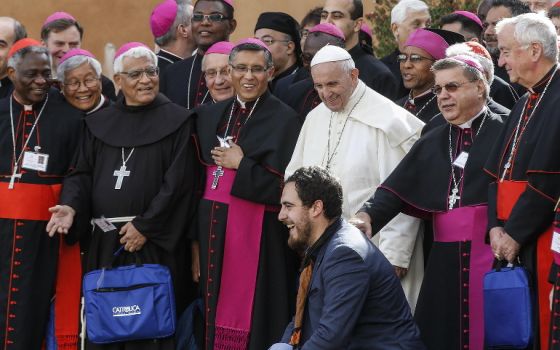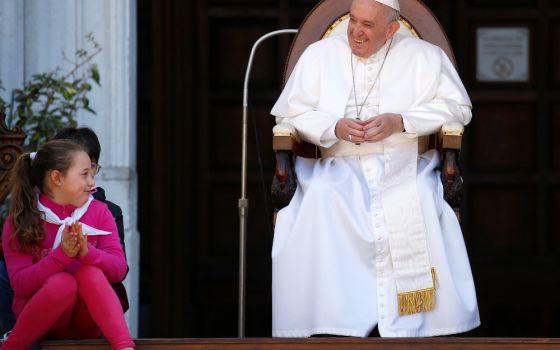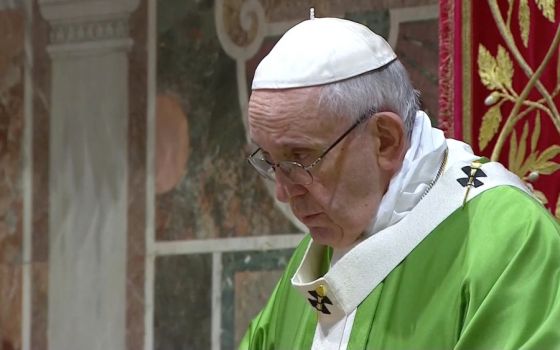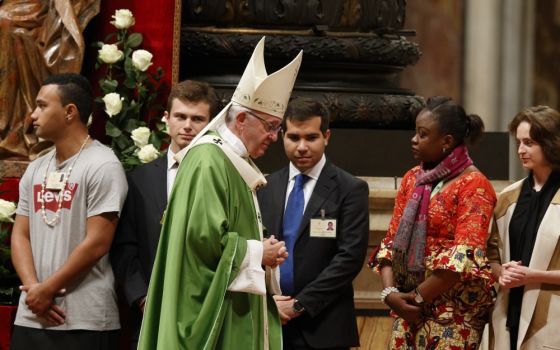Los Angeles Auxiliary Bishop Robert Barron gives the keynote address at a conference called "Cultures of Formation: Young People, the Faith and Vocational Discernment." (University of Notre Dame/Matt Cashore)
Negative cultural influences have left generations of young people confused, anxious and unhappy — conditions the church could help address if the young people weren't disconnected from church institutions. This makes the upcoming Synod of Bishops on young people, faith and vocational discernment all the more urgent, said speakers at a conference at the University of Notre Dame.
Presenters at the "Cultures of Formation" conference called for the church to be countercultural in response to contemporary attitudes toward technology, sexuality and what one speaker called the "uncritical valorization of diversity."
Less emphasized at the March 5-7 event were social issues, such as immigration or poverty, even as a small group of high schoolers have mobilized and are, as one bishop has put it, "shaming the adult world into action," on the issue of gun violence.
The goal of the conference was to examine cultural influences shaping young people and how the church could respond or "create cultures in which it's easier to be Catholic," organizer John Cavadini said, paraphrasing Catholic Worker co-founder Peter Maurin.
Cavadini is director of Notre Dame's McGrath Institute for Church Life, which co-sponsored the conference with the U.S. bishops' Committee on Doctrine. More than 500 academics, pastoral ministers and about two dozen bishops attended the March 5-7 event in advance of the pre-synod meeting in Rome later this month, which will be attended by 300 young Catholic delegates, including five from the United States. The actual synod of bishops will be in October.
But even as keynoter Auxiliary Bishop Robert Barron of Los Angeles called the upcoming synod on young people "more important" than the family synods, Catholics are still debating a footnote on Communion for the divorced and remarried in the document from those 2014-15 gatherings.
Advertisement
Of course, that issue will be moot if young people continue to leave the church in the numbers reported in recent studies. More than one third (35 percent) of millennials (born 1981-96) are religiously unaffiliated, compared with 16 percent of that generation who identify as Catholics, according to a 2015 study from the Pew Research Center.
Barron said the rise of the "nones" — those disconnected from institutional religion — is "something of an indictment of our educational and catechetical strategies" and at the same time "a real Kairos, a privileged moment to connect with young people … a call to action."
He offered responses to attitudes held by many young people today, including relativism, "bland toleration" of diversity that creates "an allergy to anything that smacks of orthodoxy," "scientism," which reduces all knowledge to the scientific method, and naïve interpretations of the Bible.
Barron criticized the "dumbing down of our faith" over the past several decades, including what he sees as an overemphasis on the emotional and experiential.
People listen as McGrath Institute for Church Life Director John Cavadini introduces Bishop Robert Barron, auxiliary bishop of the Los Angeles Archdiocese, for the keynote address at a conference called "Cultures of Formation: Young People, the Faith and Vocational Discernment." (University of Notre Dame/Matt Cashore)
Other speakers, including technology critic Nicholas Carr, warned of additional negative cultural influences. Excessive smartphone use is contributing to the loss of the "contemplative mind," Carr said in his keynote address.
"What technology discourages is the cutting off of distractions and being alone with our thoughts," he said, adding that media technology encourages users to focus on what is new, not what is important, creating "suckers for irrelevancy."
Jessica Keating of Notre Dame described how the pervasiveness of pornography among young Americans has negatively affected their ability to form relationships, while Abigail Favale of George Fox University in Oregon critiqued both "consumeristic" and "purity" paradigms of sexuality, instead holding up the Catholic "theology of the body" as an alternative.
"You all are sitting on a gold mine when it comes to sex," said Favale, a former evangelical Protestant who converted to Catholicism.
Excessive individualism and "estrangement from our own humanity" were the focus of other presentations by speakers who admitted those issues affected generations beyond the 16-29 age group identified by the synod as "youth and young adults."
Day three of the conference turned to ways for the church to address these cultural influences, with a presentation by Katherine Angulo, associate director of youth ministry for the Atlanta Archdiocese. She received applause and a standing ovation for mentioning the need for resources, including fair salaries, for those in youth and young adult ministry.
Angulo said the U.S. church does "OK" with ministry for higher schoolers and college students but does very little for young adults and middle schoolers. That latter demographic is important, she said, as the median age of a young person who leaves the church is now 13.
Citing data from the recently released study of former Catholics by St. Mary's Press, Angulo pointed out that the last sacrament young Catholics receive before leaving is no longer confirmation, but First Communion.
Yet she called the "nones" a gift, in that they serve as a mirror to reflect the church to itself, and she challenged the conference attendees: "Each of you has the privilege to pass on the faith to the next generation."
"Young people crave authenticity and vulnerability. And it's authentic to actually bring the people you're talking about to the table."
-- Nicole Perrone
Breakout workshops highlighted practical ideas for doing that, including the use of pilgrimage, the monastic tradition or service as ways to connect with young people and help them discern their vocation. (The conference, as well as the synod and its preparatory document, used the tagline: "Young People, the Faith and Vocational Discernment.")
Yet participation was low for a pre-synod survey of young Catholics, and the results may not be representative, said a social scientist at the Notre Dame conference.
Some are concerned that the family synods — with their hot-button controversy over Communion for divorced and remarried Catholics — may overshadow the synod on youth and young people.
But 26-year-old Nicole Perone is excited about it. As one of 300 lay delegates to the pre-synod meeting, she is attending as a representative of the Voices of Faith movement. Three other delegates were chosen by the U.S. bishops, while a fifth delegate will represent Eastern-rite churches.
"Young people crave authenticity and vulnerability," said Perone, who works as director of adult faith formation for the Hartford, Connecticut, diocese. "And it's authentic to actually bring the people you're talking about to the table."
[Heidi Schlumpf is NCR national correspondent. Her email address is hschlumpf@ncronline.org. Follow her on Twitter @HeidiSchlumpf.]









